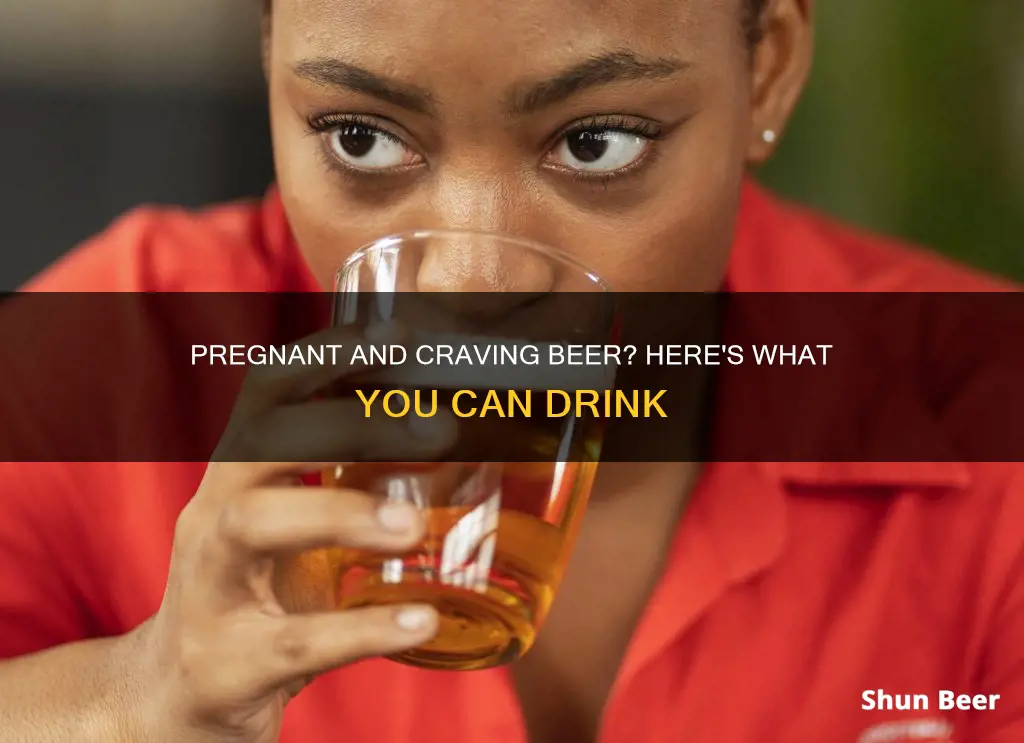
Drinking alcohol during pregnancy is generally considered a no-go due to the risk of fetal alcohol spectrum disorders (FASDs) and fetal alcohol syndrome (FAS). However, some women may wonder if they can consume non-alcoholic beer, which typically contains trace amounts of alcohol. While there is limited research on the effects of non-alcoholic beer during pregnancy, guidelines recommend abstaining from all alcohol to eliminate any potential risks to the developing fetus.
| Characteristics | Values |
|---|---|
| Is it safe to drink beer while pregnant? | No, it is not safe to drink beer while pregnant. |
| Is it safe to drink non-alcoholic beer while pregnant? | Non-alcoholic beer may contain trace amounts of alcohol, so it is not considered safe to consume during pregnancy. |
| Is it safe to drink beer while trying to get pregnant? | It is recommended to avoid drinking alcohol while trying to get pregnant. |
| What are the risks of drinking beer while pregnant? | Drinking beer while pregnant can cause fetal alcohol syndrome, miscarriage, preterm birth, stillbirth, high blood pressure during pregnancy, and other complications. |
| What are the alternatives to beer that can be consumed during pregnancy? | There are non-alcoholic alternatives to beer, such as non-alcoholic wine, spirits, and mixers, but it is important to check the labels for alcohol content and avoid ingredients like quinine and adaptogens. |
What You'll Learn
- Non-alcoholic beer may still contain alcohol
- Alcohol consumption during pregnancy is linked to fetal alcohol syndrome
- The CDC advises against drinking alcohol while pregnant
- The effects of low to moderate drinking during pregnancy are not well understood
- Drinking while pregnant can increase the risk of miscarriage

Non-alcoholic beer may still contain alcohol
Non-alcoholic beer is often marketed as a safe alternative to regular beer, and while it does contain significantly less alcohol, it is important to note that it may still contain some alcohol.
By law, non-alcoholic beers can contain up to 0.5% alcohol by volume (ABV). This means that while most of the alcohol has been removed, there can still be small amounts present. Additionally, research suggests that many non-alcoholic beers contain more alcohol than their labels indicate. One study found that 29% of no- or low-alcohol beers tested had higher alcohol levels than stated on their labels, with some containing up to 1.8% ABV.
The amount of alcohol in non-alcoholic beer can pose risks for certain individuals, including pregnant women. The American College of Obstetrics and Gynecology (ACOG) recommends that pregnant individuals avoid any alcohol consumption to eliminate the risk of fetal alcohol spectrum disorder (FASD). While FASD typically occurs with chronic high alcohol intake, there is no known safe amount of alcohol use during pregnancy. Alcohol consumption during pregnancy can cause birth defects, preterm birth, and lifelong disabilities for the child.
Therefore, even though non-alcoholic beers contain much lower levels of alcohol than regular beers, they may still possess enough alcohol to pose risks during pregnancy. As such, it is generally recommended that pregnant women avoid consuming non-alcoholic beers to eliminate any potential risks to their unborn child.
It is worth noting that there is limited research on the specific effects of non-alcoholic beer during pregnancy, and individual circumstances may vary. Pregnant women should consult their healthcare providers for personalized advice and recommendations regarding alcohol consumption during pregnancy.
Beer Enemas: Do They Work or Are They Dangerous?
You may want to see also

Alcohol consumption during pregnancy is linked to fetal alcohol syndrome
Alcohol consumption during pregnancy is a leading cause of preventable birth defects, developmental disabilities, and learning disabilities in children. Even a small amount of alcohol can cause fetal alcohol syndrome (FAS), a permanent condition that affects the fetus's development, causing physical and mental defects. FAS is the most severe condition within a group of conditions called fetal alcohol spectrum disorders (FASDs).
FASDs refer to a range of physical, cognitive, and behavioral abnormalities caused by prenatal alcohol exposure. These impairments may appear at any time during childhood and last a lifetime. The effects of FASDs can vary, but individuals with FASDs often experience challenges with understanding and following directions, switching attention between tasks, controlling emotions and impulsivity, communicating and developing social skills, and experiencing depression and anxiety.
The risk of FASDs is highest when there is binge drinking or heavy drinking during pregnancy. However, even lesser amounts of alcohol can cause harm. There is no known safe amount of alcohol consumption during pregnancy. Alcohol use during pregnancy can interfere with the baby's brain and central nervous system development, causing abnormal physical development and permanent damage to brain cells.
The effects of FAS can be lifelong and include mental and physical challenges. Children with FAS may have noticeable changes to their facial features and limbs and experience delays in their physical development. They may also face social and educational challenges, such as difficulty concentrating, learning disabilities, and poor judgment skills.
To prevent FAS and FASDs, it is essential to avoid drinking any beverages containing alcohol during pregnancy. If you are sexually active and not using effective birth control, it is recommended to abstain from alcohol because it can take four to six weeks to know you are pregnant, and alcohol consumption during this time could harm the developing fetus.
Which Alcoholic Beverage is America's Favorite: Beer or Wine?
You may want to see also

The CDC advises against drinking alcohol while pregnant
Drinking alcohol during pregnancy is a big "no-no". While it may be tempting to believe that an occasional alcoholic beverage may help lower stress levels, it's best to find other ways to relax and socialise.
The CDC and the American College of Obstetricians and Gynecologists (ACOG) agree that no amount of beer or any alcohol is safe to drink during pregnancy. While it is common knowledge that moderate to heavy drinking is harmful to the developing foetus, there is no established "safe" threshold for low-level alcohol consumption. Even non-alcoholic beers may contain small amounts of alcohol, so it's best to avoid them.
The effects of alcohol on the foetus are devastating and can cause a group of disabilities known as fetal alcohol syndrome (FAS). Children born with FAS may experience vision and hearing issues, developmental delays, learning difficulties, behavioural problems, and a vulnerability to substance abuse disorders. They may also be born prematurely, with associated health complications including hearing and vision problems and developmental delays.
The CDC advises that women who are sexually active and want to get pregnant should avoid alcohol. For those who are pregnant and struggling with alcohol dependence, it is vital to seek help from a healthcare provider.
While some studies suggest that light drinking during pregnancy may not cause harm, the CDC maintains that abstinence is the best course of action. The potential risks of alcohol consumption during pregnancy far outweigh any benefits, and it is crucial to put the health and well-being of the mother and child first.
Drinking Alcohol-Free Beer at Work: Is It Okay?
You may want to see also

The effects of low to moderate drinking during pregnancy are not well understood
Drinking alcohol during pregnancy is generally not recommended. The CDC and the American College of Obstetricians and Gynecologists (ACOG) agree that no amount of alcohol is safe to drink during pregnancy. Alcohol passed to a fetus from the parent's blood through the umbilical cord can stay in their body for long periods, and can lead to fetal alcohol syndrome (FAS), which causes vision and hearing issues, developmental delays, trouble concentrating, learning and behavioural issues, and vulnerability to substance abuse disorders.
However, the effects of low to moderate drinking during pregnancy are not well understood. While heavy alcohol consumption during pregnancy is known to cause problems, the impact of an occasional glass of wine or beer is less clear. Some studies suggest that low to moderate alcohol consumption during pregnancy does not affect executive functioning in children. For example, a 2012 Danish study found no difference between children whose mothers drank low to moderate amounts of alcohol and those who abstained completely during pregnancy. However, this study had a relatively small sample size, and the children's brains were still developing at the time of the study, so the full effects of alcohol may not have been measurable.
Additionally, a 2018 study found that pregnant people who consumed more than 12.5 alcoholic drinks per week had higher odds of experiencing pregnancy-related high blood pressure disorders. However, this study did not specifically look at the effects of low to moderate drinking.
While there is no conclusive evidence that low to moderate drinking during pregnancy is harmful, it is important to note that there is also no established "safe" amount of alcohol that can be consumed during pregnancy. The potential risks of alcohol consumption during pregnancy include miscarriage, stillbirth, fetal growth restriction, and high blood pressure complications. Therefore, until more research is conducted, it is recommended that pregnant women avoid alcohol altogether.
Drinking Beer Through a Straw: Is It Possible?
You may want to see also

Drinking while pregnant can increase the risk of miscarriage
Drinking alcohol while pregnant can cause harm to the baby in the womb and lead to long-term medical problems and birth defects. When a pregnant woman drinks alcohol, it travels through her bloodstream and passes to the baby via the umbilical cord. As a result, the baby's blood alcohol level remains high for longer than the mother's, which can cause harm to the baby and, in some cases, lead to lifelong damage.
Binge drinking (consuming five or more drinks in one sitting) significantly increases the baby's risk of alcohol-related damage. Heavy drinkers (those who consume more than two alcoholic beverages per day) are at a greater risk of giving birth to a child with fetal alcohol syndrome (FAS). FAS is a group of defects in the baby that can include behavioural and attention problems, changes in facial structure, poor growth before and after birth, poor muscle tone, and problems with movement, balance, thinking, and speech. These problems can range from mild to severe and persist throughout the child's life.
While there is conflicting research on the effects of light drinking during pregnancy, it is generally recommended that pregnant women abstain from alcohol consumption to eliminate any potential risks to the baby.
Beer and Lithium: What's the Verdict?
You may want to see also
Frequently asked questions
No amount of beer is considered safe to consume during pregnancy. Even non-alcoholic beer may contain traces of alcohol.
Drinking while pregnant can put the pregnancy at risk of complications and cause pregnancy loss, preterm birth, and lifelong disabilities for the baby.
Babies born with fetal alcohol syndrome (FAS) may be born prematurely and underweight. They may also have physical deformities such as a thin upper lip, small eye openings, and a small head. Children with FAS often experience learning disabilities, behavioural issues, and problems with coordination and socialising.
There are several non-alcoholic beers available, such as Hairless Dog and Heineken 0.0%. Other options include non-alcoholic wines, spirits, and mixers. However, it is important to read labels carefully and avoid products containing adaptogens, which are not proven safe for consumption during pregnancy.







